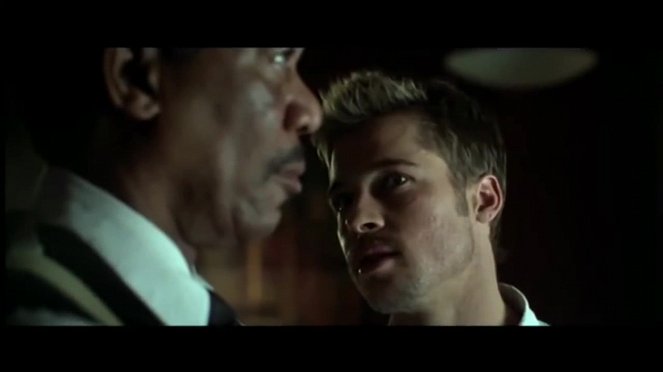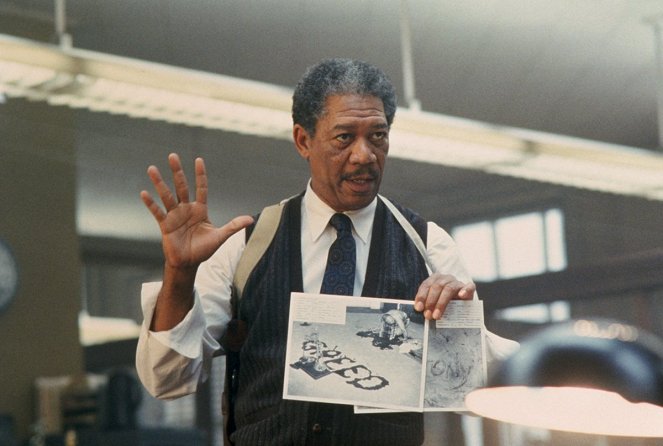Ohjaus:
David FincherKäsikirjoitus:
Andrew Kevin WalkerKuvaus:
Darius KhondjiSävellys:
Howard ShoreNäyttelijät:
Brad Pitt, Morgan Freeman, Gwyneth Paltrow, Richard Roundtree, R. Lee Ermey, John C. McGinley, Kevin Spacey, Julie Araskog, Mark Boone Junior (lisää)Suoratoistopalvelut (3)
Juonikuvaukset(1)
Rutiinietsinnän aikana löydetään ateriansa keskelle murhattu mies. Joku on kirjoittanut sanan "mässäily" jääkaapin taakse. Pian paljastuu toinen yhtä raaka murha ja sen rikospaikkaan on kirjoitettu verellä sana "ahneus". Poliisit Somerset ja Mills laskevat nopeasti yhteen yksi plus yksi – ja saavat vastaukseksi seitsemän! Liikkeellä on psykopaattinen sarjamurhaaja joka systemaattisesti murhaa uhrinsa seitsemän kuolemansynnin mukaan! Missä ja milloin tapahtuu seuraava julma murha? (SF Film Fin.)
(lisää)Videot (2)
Arvostelut (10)
I am going to be much soberer and in opposition to film fans on FilmBooster, who ranked Seven in the top ten, I have to say that in my opinion, the film has only one, but very significant plus in the form of David Fincher's atmospheric direction. Just like elsewhere in his work, he works magic with the camera, carefully creates scenes, plays with sound and imagery, and everything is subordinated to maximum effect and audience experience. Unfortunately, at the expense of logic, it is simply straightforward. Instead of being a crime thriller, it leans more toward the horror genre, specifically foreshadowing the later successful horror series Saw. The screenplay is overly complicated, just like in similarly tuned films with a brilliant manipulator, such as Primal Fear, and this simply would not work in reality. It is interesting to observe several film details where Fincher subordinates everything to the atmosphere. For example, wherever the characters enter, it must be dimmed and for God's sake, no one should press the light switch. They use flashlights or the room is sparsely illuminated by red flashes, to emphasize the gloominess of the environment and its mystery. The director chooses the most repulsive environments, neglected and dirty alleys on the outskirts, and old buildings with peeling facades, and plays even more with the interiors. These are usually much more dirty and devastated than would be possible in reality. The camera revels in decay and mold, which would have already alerted the surrounding tenants to some irregularities. The police officers enter an apartment with their guns raised and proceed to the last room, where they only then lift the cover off the victim, suddenly clutching their noses. Again, Fincher subordinates everything to the element of surprise. It is good to compare the dynamically shot chase scene in an apartment building with the chase scene on the roofs and in the apartments of an Arab quarter in The Bourne Supremacy. While the latter fits organically into the story, here the culprit should be able to run down the stairs and disappear through the main exit, but that would, of course, be artistically unattractive, so Fincher lets his villain and the pursuer run through parts of the house that probably no one has yet built and will never build because it would be an unapprovable architectural masterpiece. There are many similar absurdities, but the power of Fincher's unmistakable directorial style is so pronounced that it reliably conceals them in the eyes of the majority of viewers. Even I have to appreciate the atmospheric nature of the scene where Brad Pitt has a gun to his head and expects a shot. The brutality of the individual crimes naturally also captures the audience's interest, but my impression is lowered by the philosophical framework of the drama, with which I do not identify in the least. While another Fincher film, Fight Club, seemed like a great portrayal of the phenomenon of rebellion, anarchy, and consumerism in a modern metropolis, here the nihilism and depression seem inappropriate to me. Overall impression: 60%.
()
(vähemmän)
(lisää)
Fincher is depressive again, in the way he only knows how. The murders are disgusting, especially the first one with the fat man is not very nice to see. The cops don't seem to know what a light switch is, so they keep shining their flashlights to make the most of the gloomy twilight. The perpetual rain doesn't help the mood, either, Scott knew that in Blade Runner. Depression alternates with depression and the interesting, gloomy screenplay plays into Fincher's hands, he is a master depression, we all know that. Add to this an irresistibly loathsome villain played by Spacey and a truly unusual ending for Hollywood and we get a clear five-star rating.
()
Indeed, a perfect essay on the themes of "modern civilization and its morbid brutality". Fincher convinced so much through this film that he is one of the creators with a distinctive style and, above all, a talent to make a dramatic film with an idea. The parallel with Dante and classical European literature is largely simplistic, but the message of Seven to the viewer is all the more overwhelming. It is hard to resist characters that draw you into the action so much thanks to the excellent acting portrayal that the end of the film is also the viewer's revelation and a painful catharsis. Morgan Freeman's role in particular is one of the best ever created in the thriller genre. And I have a feeling that Seven has reached the limit of the genre. We live in a time that gives the concept of sin a whole new dimension. Seven is the perfect illustration of this...
()
Alongside The Silence of the Lambs, this is the most powerful psycho-thriller ever. Seven is a gem of the genre in which every filmmaking component is stretched to the absolute limit, along with the viewer’s nerves, emotions and psyche. Darkness that will take your breath away and keep you up at night.
()
A slowly flowing depression with a flood of rain, darkness, and uncertainty. A brilliant madman in the background, a silent and slightly shy police veteran, a young hard worker by his side, and his saddened wife. A fatal final half-hour and a finale that seems simple in the first second but gains strength and resonates in the viewer long after the movie ends. I highly recommend a second viewing, where several hints towards the punchline can be found. Jigsaw and other plagiarists can go laugh at themselves.
()


